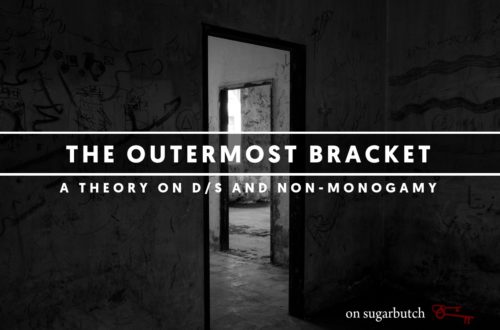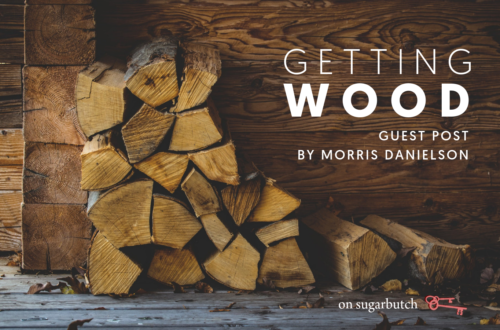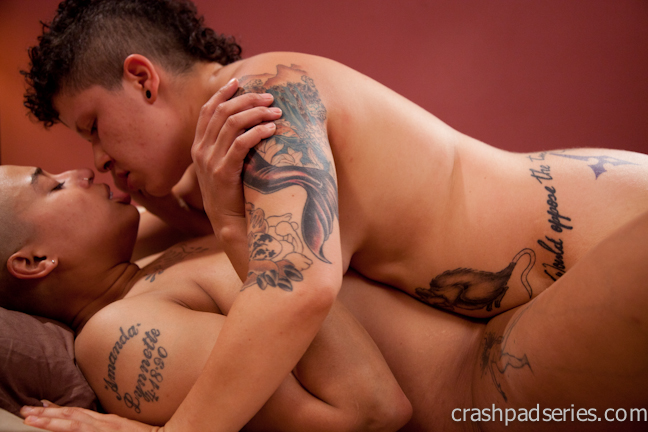This site contains explicit writings on kink practices, dominant/submissive relationships, and queer kink erotica (among other things). All characters in role play or non-consent scenes are consenting adults. Content warnings are included.
Aida Manduley, www.smutandsensibility.com, @neuronbomb
1. What insight about polyamory/open relationships would you share with your younger self?
Don’t assume that because someone you are dating is poly and one of their partners gets tested regularly, that your partner in common ALSO gets tested (or is STI-free for that matter). Do not make ANY assumptions about people’s sexual health; bring it up! If someone doesn’t want to talk about that with you, run far away! And if it’s you that feels nervous because you’re a n00b and you don’t know what poly etiquette is because you’re not the primary/spouse/etc., BRING IT UP ANYWAY. This will help you take care of yourself and your future partners PLUS it will show that you are a mature, responsible individual. In a relationship, unless explicitly negotiated otherwise or something, you can and should ask questions (albeit respectfully).
Even if boundaries make sense, make sure to ask and/or be explicit about the reasoning behind them, so when someone makes decisions on the spot and needs an educated guess to proceed, they have all the information they need.
Also, remember that poly is something you need to work on and think about even when you’re not “actively” pursuing/seeing other people. Think of it as exercising the love muscle.
2. What has been the hardest thing about navigating multiple relationships, and how have you overcome that?
When it’s me juggling multiple partners, it has come down to time-management and making everyone feel valuable while not being able to give everyone equal time. My calendar is busy as is, and when trying to stick in multiple romantic/sexual relationships, it can get pretty wild. The only way it works is because I have BusyCal/iCal/GoogleCal and I’m not afraid to use it.
When it’s a primary partner expanding their relationships, it has been confronting seemingly irrational, sudden feelings of sadness and jealousy. This actually happened recently, when my long-term primary partner began to explore outside our relationship after a long time of not doing so. I felt this intense possessiveness and it was deeply uncomfortable for everyone involved. It’s easy for me to say “heck yeah!” to partners dating others when I LIKE and know the people they’re dating, but when it’s a random person I’ve never met or someone I don’t particularly like? I get uneasy and nervous about it. The reasons could be different depending on the relationship, but in this case, it wasn’t a fear of being abandoned or replaced or anything … it was a fear that the “outsider” wasn’t good enough; it was about not wanting to feel out of control, like the outside stuff would progress regardless of how I felt about it; and it was the discomfort with having to “share” my partner with someone I didn’t necessarily like when I ALREADY was only able to see them one or two days a week.
I consider myself a level-headed and logical person capable of compersion, so in the instances when I reacted very negatively or surprisingly, it really shook me. I have high standards for myself in every way, and not being able to be the partner I want to be (or that my partners deserve) is upsetting. Add that guilt/feelings of temporary weakness/failure to the feelings of jealousy/sadness over whatever the situation is and it’s a pretty shitty situation. The way I’ve dealt with it has been to WRITE MY HEART OUT; have lots of honest, open, and difficult conversations; and cry. Part of it has also been re-reading things I’ve written about polyamory in the past, revisiting blogs I consulted when I was first getting into this, talking to other people going through some rough times, and just immersing myself in the issue instead of trying to avoid it. It’s also been about trusting my partner.
Speaking in general, though, part of it has been unlearning some of the more ingrained ideas about what love, commitment, and relationships are “supposed” to be like. There was a LOT of unlearning and deconstructing when I embarked in my first relationship with a poly (and married) man, but I still find myself unlearning things to this day–things I didn’t even realize were part of those “packaged” notions. I’ve found it’s also about being able to come to terms with those things I DO want and feeling no (or little!) shame about them, since there are ideas floating around about what “perfect poly” is like and how “evolved” some models are, and there’s pressure to conform to those ideals.
3. What has been the best thing about being open/poly?
Aside from the obvious “being able to let relationships take their own individual courses without having to fit into a perfect mold” and “fulfilling more needs in multiple places,” I think another super cool piece of it is being able to feel New Relationship Energy and those exciting sparky feelings of flirting with (and/or crushing on) people many times throughout my life (while still maintaing steady relationships). Furthermore, being able to share that with another partner (whether it’s because I’m feeling NRE or they are for someone else that we both like) is fantastic.
Also? It was AWESOME having a loving support system (in the form of my primary partner) when I went through a rough breakup. Having him around as I grieved/dealt with the debacle of that other relationship and its roller-coaster ride helped immensely. It was nice to know someone still loved and supported me in that situation! In fact, my partner even helped me process and think through a lot of what happened, giving me perspective and reassurance when my morale was low.
4. Anything else you’d like to add?
Read up on the Love Languages. Figure out what your style is, and think about what ways you like to communicate. Make sure your partners are aware of their own style, and that you all communicate about this.
Finally, it’s okay to want a label for yourself and your relationships. So much focus gets placed on exploding binaries and breaking categories down that sometimes we forget how labels can be HELPFUL and comforting, how they can help people carve a space for others in their lives and vice-versa. The trick is to figure out what those labels actually MEAN on your own terms and to be intentional about those definitions.



